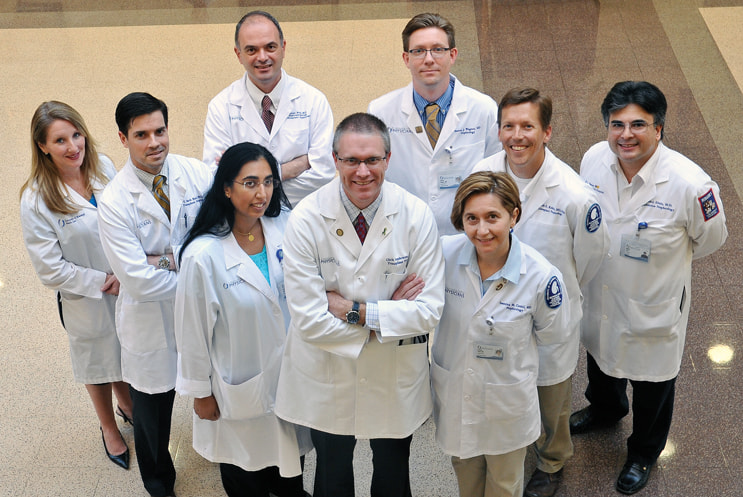Kidney transplants hit UMMC record in 2012, liver service to restart this year

Teams at the University of Mississippi Medical Center transplanted a record 103 kidneys last year, a figure they could surpass in 2013 even while preparing to restart liver transplantations following a 22-year hiatus.“This record stands as a benchmark as we work toward becoming a complete abdominal-organ transplant center,” said Dr. James Keeton, UMMC vice chancellor for health affairs.
“Our talented faculty and staff members couldn’t have accomplished this without the support of our partners at the Mississippi Organ Recovery Agency.”
“Our talented faculty and staff members couldn’t have accomplished this without the support of our partners at the Mississippi Organ Recovery Agency.”

The all-time high in kidney transplants allowed more patients to see dramatic quality-of-life improvements. As well, more patients could stay close to home for the major procedure than ever before, said Dr. Christopher Anderson, associate professor of surgery and division chief of transplant and hepatobiliary surgery.
“We’re extremely proud that we hit this mark. It means advanced care is more available for Mississippians and that our transplant program’s capabilities have achieved a new level,” he said.
“We’re also pleased to see our success rate in these patients is on par with what you’d expect to see nationally.”
No other health-care facilities in Mississippi transplant organs.
With approval in late January from the United Network for Organ Sharing, the governing body for organ transplantation in the U.S., the Medical Center cleared the final regulatory hurdle to perform liver transplants. UMMC last performed a liver transplant in 1991.
The first case for the renewed liver-transplant program could come this year. The team will begin evaluating and listing patients for liver transplants immediately.
With the service again available, more Mississippi patients will be able to receive lifesaving care close to home.
“We know there are about 60 patients a year who have to leave the state for liver transplants. But probably there are also people who need liver care but can’t or don’t get it,” Anderson said. “We can now offer this care to all patients in Mississippi.”
The 103 kidney transplants facilitated another record figure. Last year the highest percentage ever of Mississippi-donated kidneys stayed in the state.
Also in 2012, the teams performed the first of two kidney transplants ever in the Blair E. Batson Hospital for Children. Previously pediatric patients received their transplants in University Hospital.
“We’re going to preferentially perform transplants at Batson Children’s Hospital for all patients under 18. The pediatric support and expertise there, especially for younger children, is a tremendous asset,” Anderson said.
A strong relationship with the Mississippi Organ Recovery Agency helped make the record possible. The Medical Center receives organs through MORA the federally designated organ procurement organization for most of the state.
“This transplant record at the University of Mississippi Medical Center is wonderful but it couldn’t have happened without the families from Mississippi who said yes to donating their loved one’s organs,” MORA Chief Executive Officer Kevin Stump said.
“MORA has long supported the efforts of UMMC leadership to grow the transplantation programs so we’re very pleased by this success.”
The restarted liver program means more Mississippi-donated livers will stay in the state.
“For us that’s a positive, because if a recipient wants to meet a donor family, it’s a lot easier to meet in Mississippi than to have the donor family or recipient drive 15 hours to another state,” Stump said.
MORA and UMMC are working to reinvigorate a living-donor kidney program. Kidneys donated by living people statistically function longer and better.
“We have our first living-donor case coming through in summer 2013,” Anderson said.
Many reasons account for the kidney transplant record, including growth of the transplant-coordinating staff, hiring of a second transplant surgeon and addition of a third transplant nephrologist.
“But the bottom line reason is that we as a university and as a transplant group decided we’re going to do a better job of serving the needs of Mississippians,” Anderson said.
Transplantation programs rely on far more people than surgeons alone. Nurses and nurse practitioners, medical nephrologists, transplant coordinators, radiologists and techs, tissue typing laboratory staff, anesthesiologists and other members of the operating room team, staff in the blood bank and pathology labs all get involved.
“There are a lot of people, logistics and moving parts. Without commitment from the greater institution, we wouldn’t have this success,” he said.
Anderson would like to average 150 kidney transplant cases a year within five years. Achieving that will require increases in both living and deceased donations.
“I certainly think we have the rate of disease in Mississippi to justify these numbers,” he said. “So we’re projecting 2013 will be an even bigger year.”
“We’re extremely proud that we hit this mark. It means advanced care is more available for Mississippians and that our transplant program’s capabilities have achieved a new level,” he said.
“We’re also pleased to see our success rate in these patients is on par with what you’d expect to see nationally.”
No other health-care facilities in Mississippi transplant organs.
With approval in late January from the United Network for Organ Sharing, the governing body for organ transplantation in the U.S., the Medical Center cleared the final regulatory hurdle to perform liver transplants. UMMC last performed a liver transplant in 1991.
The first case for the renewed liver-transplant program could come this year. The team will begin evaluating and listing patients for liver transplants immediately.
With the service again available, more Mississippi patients will be able to receive lifesaving care close to home.
“We know there are about 60 patients a year who have to leave the state for liver transplants. But probably there are also people who need liver care but can’t or don’t get it,” Anderson said. “We can now offer this care to all patients in Mississippi.”
The 103 kidney transplants facilitated another record figure. Last year the highest percentage ever of Mississippi-donated kidneys stayed in the state.
Also in 2012, the teams performed the first of two kidney transplants ever in the Blair E. Batson Hospital for Children. Previously pediatric patients received their transplants in University Hospital.
“We’re going to preferentially perform transplants at Batson Children’s Hospital for all patients under 18. The pediatric support and expertise there, especially for younger children, is a tremendous asset,” Anderson said.
A strong relationship with the Mississippi Organ Recovery Agency helped make the record possible. The Medical Center receives organs through MORA the federally designated organ procurement organization for most of the state.
“This transplant record at the University of Mississippi Medical Center is wonderful but it couldn’t have happened without the families from Mississippi who said yes to donating their loved one’s organs,” MORA Chief Executive Officer Kevin Stump said.
“MORA has long supported the efforts of UMMC leadership to grow the transplantation programs so we’re very pleased by this success.”
The restarted liver program means more Mississippi-donated livers will stay in the state.
“For us that’s a positive, because if a recipient wants to meet a donor family, it’s a lot easier to meet in Mississippi than to have the donor family or recipient drive 15 hours to another state,” Stump said.
MORA and UMMC are working to reinvigorate a living-donor kidney program. Kidneys donated by living people statistically function longer and better.
“We have our first living-donor case coming through in summer 2013,” Anderson said.
Many reasons account for the kidney transplant record, including growth of the transplant-coordinating staff, hiring of a second transplant surgeon and addition of a third transplant nephrologist.
“But the bottom line reason is that we as a university and as a transplant group decided we’re going to do a better job of serving the needs of Mississippians,” Anderson said.
Transplantation programs rely on far more people than surgeons alone. Nurses and nurse practitioners, medical nephrologists, transplant coordinators, radiologists and techs, tissue typing laboratory staff, anesthesiologists and other members of the operating room team, staff in the blood bank and pathology labs all get involved.
“There are a lot of people, logistics and moving parts. Without commitment from the greater institution, we wouldn’t have this success,” he said.
Anderson would like to average 150 kidney transplant cases a year within five years. Achieving that will require increases in both living and deceased donations.
“I certainly think we have the rate of disease in Mississippi to justify these numbers,” he said. “So we’re projecting 2013 will be an even bigger year.”


